
Bruno Dias is a video game writer and designer. He’s currently a narrative designer at Failbetter Games, writing for Fallen London and working on an unannounced project. Previously, he’s been a Giant Bomb and Vice contributor, the narrative designer on Neo Cab, and a writer on several games including Pathologic 2.
2020 was not a year for enjoying things. It was a year where finding and evaluating new games was harder than normal, like literally everything else, and where I found myself gravitating even more than usual towards old gaming comforts.
In a year of diminished joys and expectations it was hard to cobble together a top 10 list. Usually there’s a gap somewhere between the true standouts and the games that were merely good; this year, it didn’t feel realistic to even put them in the same category.
So, this year, I have five games that I’m calling honorable mentions: Games that I have mixed feelings about, or that I felt were good but not truly exceptional. And then I have five games that I think are in a league of their own.
Honorable Mentions
Animal Crossing: New Horizons
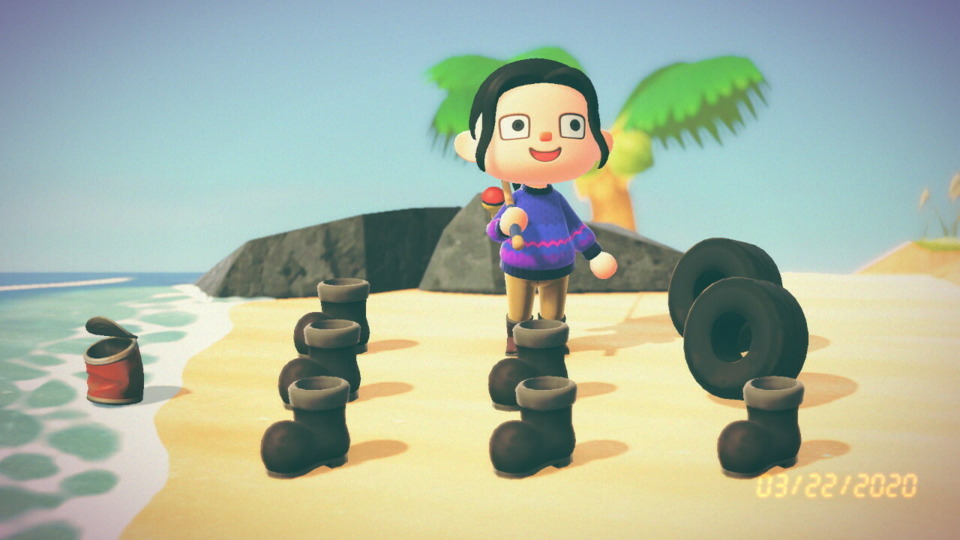
I have very mixed feelings about this game. It’s obviously a lovingly crafted space of comfort and warmth that has helped so many of us stay sane, myself included. It can also feel like an emotionally manipulative pile of chores that seems to draw on the worst impulses of live service games without any of the rewarding aspects. I crashed out of Animal Crossing hard, and my feelings towards it are probably harsher than they need to be. But there’s no there there, on that island; it feels like coziness and cuteness without substance, which is fair enough in a game that is, ultimately, still for kids. But the position that game ended up having in the culture was just untenable and incompatible with honest enjoyment; and as 2020 wore on, my patience for ‘wholesomeness’ in games ran out entirely.
Desperados III
There was a lot of ‘oh, one of those’ for me this year and this is my ‘One of Those’ of the Year. It’s just a well-designed game and I’m glad it exists, especially given that the old Commandos games don’t really exist in a playable form right now. In a way, it feels fundamentally like a remix of Shadow Tactics, but not in a bad way: It has its own design space that emerges from recombining which characters have what kinds of abilities. It feels like Mimimi can keep making these forever and I will keep buying them.
Persona 5 Royal
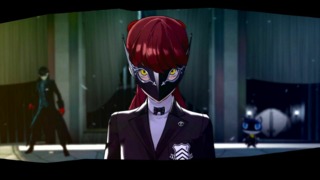
This is 90% of a game that I had already played with some small additions that I love but which are fundamentally inessential to what the original game was. It is so very inefficient with the player’s time, but that’s endemic to the genre.
It also ends with a boss fight set to a rock ballad sung from the perspective of the villain explaining his hateful ideology to you, after an epilogue that is somehow an escalation from the original game’s ending which already had you (spoilers for a 2016 game) shooting god in the head with a giant bullet forged from the seven deadly sins. I love it dearly and I am never finishing my NG+ save.
Marvel's Spider-Man: Miles Morales
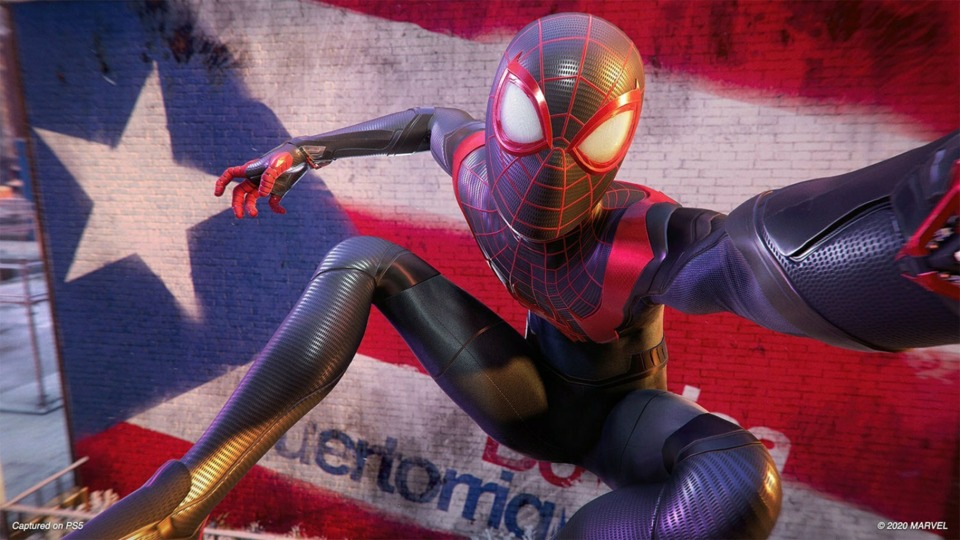
This game is heartbreaking for me. It’s the product of incredibly talented people writing some very compelling characters but is constantly hamstrung by the confines of what’s politically acceptable for a big-publisher boxed product to say and what’s expected of the superhero genre.
It’s baffling how much these two Spider-Man games love the police, and between when the game came out and what it’s notionally about, Miles Morales makes it look even more nonsensical. One of the open-world activities in this game is beating people up and sending them to jail because they hacked an electronic billboard, at which point I kind of just have to disengage from the game in frustration--it doesn’t feel very heroic to be kicking someone’s ass in the name of advertising.
Destiny 2: Beyond Light
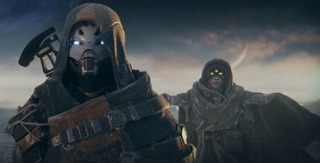
Destiny’s narrative design has never been better. It feels like after seven years Bungie is finally figuring out how to tell the story they want to tell with this game, and it is incredible. Destiny always struggled with seeming like a vivid world that existed apart from the bulk of the game, and Beyond Light has done the most to bridge that gap. I am consistently looking forward to what Bungie does next.
--
Now, here are the games I genuinely loved this year.
Crusader Kings III

Crusader Kings is built on using the framework of a grand strategy game to give stakes and context to a sophisticated social sim. The third game in the franchise finally achieves the promise of that idea by making its world and its characters readable enough to bring its stories to life.
This game also exemplifies designing for a certain balance for me. CK3 bites back a lot more than CK2 did, explicitly pushing against typical player goals: If you build a huge empire, it’s very likely to splinter on succession; if you start your own heresy, prepare for endless crusades aimed at your head. By keeping the player desperate and scrabbling, it ensures that the interpersonal drama is happening against the right backdrop. By keeping every king in the game off-balance and precarious, it ensures there’s always opportunity and temptation for the player. It’s a more polished, careful design than Paradox has managed previously, and by far my favorite strategy game of 2020.
World of Horror
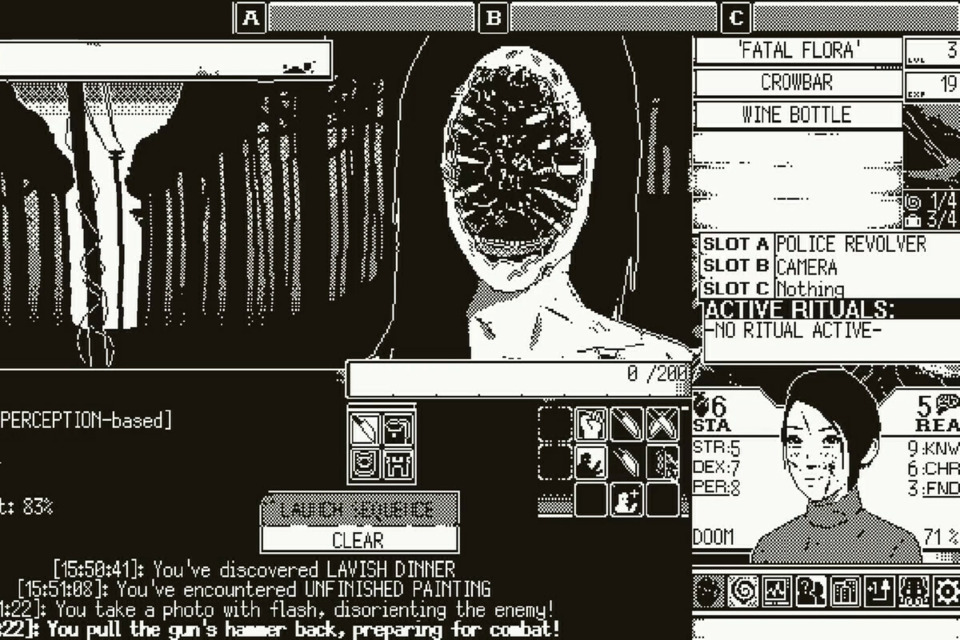
The game I most hope becomes a genre, though it probably wouldn’t have found the audience that it did without the disgustingly clever idea of using black and white 1-bit graphics to present an extended Junji Ito pastiche.
World of Horror is one of the best card-deck narrative games I’ve ever seen. It’s trying to capture a very specific mood: the deranged tone of Uzumaki, Ito’s horror manga that is nightmarish specifically in that it resembles a bad dream that keeps stumbling from one horror idea to the next. World of Horror’s Shiokawa works in exactly this way: Bizarre and unsettling things are just prowling the city and liable to crop up at any time, whether they seem to relate to the mystery you’re presently investigating or not. This loose, freewheeling sense of reality dissolving perfectly fits the card-deck narrative structure of the game. Perhaps not coincidentally it’s also what being alive in 2020 and constantly on Twitter feels like, a treadmill of fresh horrors being delivered on queue as you try to crack the mystery of who the main character is today.
Haunted Cities Vol. 4
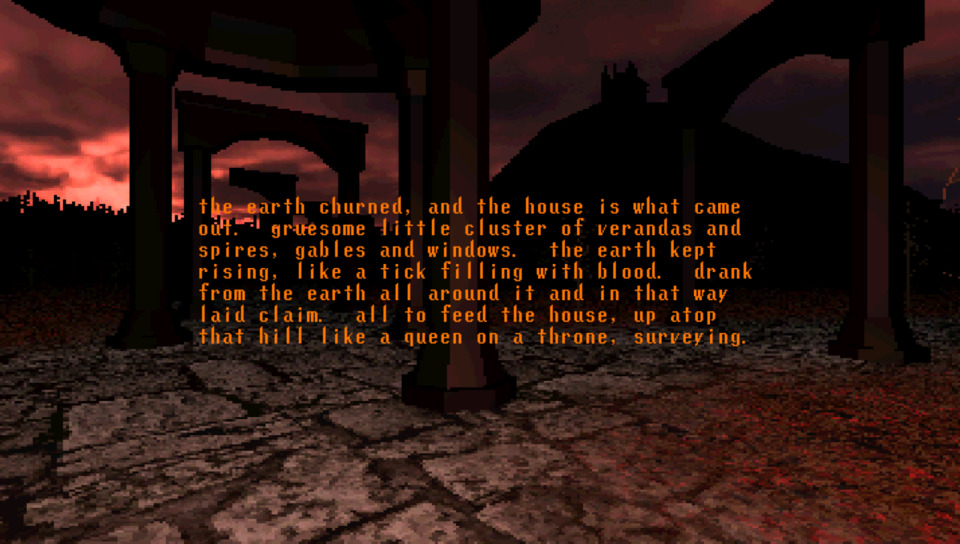
I am once again asking you to play Kitty Horrorshow’s work.
Horrorshow is probably the greatest artist working in weird fiction right now. The absolutely devastating mix of environment, ambiance, pacing, and writing in her games has been very powerful for a long time. The short games contained in Haunted Cities Vol. 4 were released to her Patreon supporters over the course of 2019, but they feel like they could have been written from the ache and claustrophobia of 2020. They’re about bodies falling apart, about places of threat and imprisonment, about a sense of being stuck in limbo that is all too familiar now.
Four games are included in this collection: Grandmother’s Garden, a piece that hits notes of folk-horror mysticism to tell a story about abuse and codependency. Lethargy Hill contains some of the most painfully embodied writing I’ve ever seen. Tenement is a collection of connected stories built on a gorgeously unsettling conceit, wrapped up in a presentation that plays with the small scale of Horrorshow’s games.
Exclusion Zone is probably the best one, though it’s close. It’s horrific and poignant and suggestive. Most of all, Horrorshow’s work is never inessential or repetitive; every image and every word feels needful.
Chess
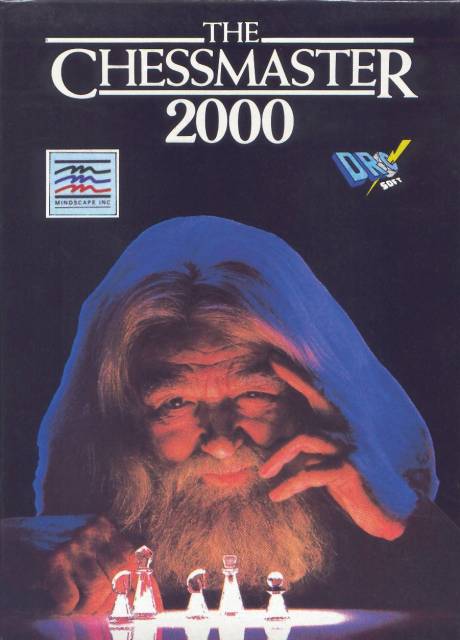
2020 was an unexpectedly big year for chess; the game is essentially becoming an esport, and all of a sudden it’s having a huge spike in popularity after Queen’s Gambit, a show that didn’t succeed in making me watch more than four episodes but which did succeed into making me think about chess again.
I’ve played chess on and off for years, but never as much as I did in 2020. A 10-minute online chess match scratches the itch of competitive gaming while somehow being easier to fit into my life than something like League of Legends or even Age of Empires 2: Definitive Edition. There’s no patch notes to keep up with, no DLC to buy, no items to grind for. The fact that I will never be good enough at chess to say I am even remotely competent at it is actually extremely liberating. In fact, there’s a particular joy in playing chess like a maniac. Like other people who have a sub-1000 rating, I am very bad at playing the Sicilian. Will this stop me from going c5 every time I have the black pieces and my opponent starts on e4? No, absolutely not; doing stupid shit is the point.
Chess is also my spectator game of the year. High-level chess had been over-theorized and extremely drawish for a long time. But in 2020, over-the-board tournaments have essentially halted. This has given rise to a number of online events which usually have a shorter time format, and that has led to more interesting and swingy games at the GM level. Everyone’s brain is a little bit broken right now, and chess grandmasters are no exception; it has given rise to the most entertaining chess in a long time.
Kentucky Route Zero: TV Edition
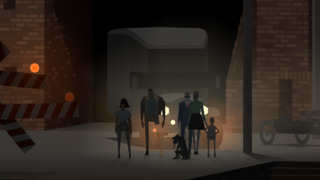
50 years ago in 2013, when the first chapter of KR0 came out, I bought it and installed it on my Windows 7 machine, as was the style at the time. It didn’t grab me then.
But Kentucky Route Zero, in its completed form, is my game of the year. For one blessed week in February, I engaged in a daily ritual of playing one chapter of the game every evening, just after dark. This is a game that benefits enormously from being on a big screen and from being played at a reasonable pace. It’s a shockingly unified piece of work that somehow captures the last 10 years’ sense of falling apart without the relief of hitting the ground in pieces.
Think about what that means: Kentucky Route Zero was originally pitched to audiences as a Kickstarter in 2011. It was conceived in response to one crisis and, through its unusually long development cycle, managed to finally end as a complete work just in time for another to begin. In a way, as a single game, it bookends this catastrophe of a decade. Kentucky Route Zero is my undisputed Game of the Year.